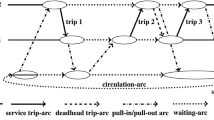Abstract
The police aim for using electric vehicles within the criminal investigation service. However, the challenges related to the use of electric vehicles result in a limited availability of these vehicles. Until now, decision support for fleet operation with electric vehicles at the police is missing. This contribution introduces an extension of the Electric Vehicle Scheduling Problem for the police.
Access this chapter
Tax calculation will be finalised at checkout
Purchases are for personal use only
Similar content being viewed by others
References
Adler, J. D., & Mirchandani, P. B. (2016). The vehicle scheduling problem for fleets with alternative-fuel vehicles. Transportation Science, 51(2), 441–456.
Bektas, T. (2006). The multiple traveling salesman problem: an overview of formulations and solution procedures. Omega, 34(3), 209–219.
Bunte, S., & Kliewer, N. (2009). An overview on vehicle scheduling models. Public Transport, 1(4), 299–317.
Gnann, T., Plötz, P., Funke, S., & Wietschel, M. (2015). What is the market potential of plug-in electric vehicles as commercial passenger cars? A case study from Germany. Transportation Research Part D: Transport and Environment, 37, 171–187.
Sassi, O., & Oulamara, A. (2017). Electric vehicle scheduling and optimal charging problem: complexity, exact and heuristic approaches. International Journal of Production Research, 55(2), 519–535.
Schneider, M., Stenger, A., & Goeke, D. (2014). The electric vehicle-routing problem with time windows and recharging stations. Transportation Science, 48(4), 500–520.
Tas, D., Jabali, O., & Van Woensel, T. (2014). A vehicle routing problem with flexible time windows. Computers and Operations Research, 52, 39–54.
van Kooten Niekerk, M. E., van den Akker, J. M., & Hoogeveen, J. A. (2017). Scheduling electric vehicles. Public. Transport, 9(1–2), 155–176.
Wang, H., & Shen, J. (2007). Heuristic approaches for solving transit vehicle scheduling problem with route and fueling time constraints. Applied Mathematics and Computation, 190(2), 1237–1249.
Wang, Y., Huang, Y., Xu, J., & Barclay, N. (2017). Optimal recharging scheduling for urban electric buses: A case study in Davis. Transportation Research Part E: Logistics and Transportation Review, 100, 115–132.
Wen, M., Linde, E., Ropke, S., Mirchandani, P., & Larsen, A. (2016). An adaptive large neighborhood search heuristic for the electric vehicle scheduling problem. Computers and Operations Research, 76, 73–83.
Acknowledgements
This work is part of the research project lautlos and einsatz-bereit which is funded by the Federal Ministry for the Environment, Nature Conservation, Building and Nuclear Safety (BMUB). The authors would like to thank for the support.
Author information
Authors and Affiliations
Corresponding author
Editor information
Editors and Affiliations
Rights and permissions
Copyright information
© 2018 Springer International Publishing AG, part of Springer Nature
About this paper
Cite this paper
Schmidt, K., Saucke, F., Spengler, T.S. (2018). Scheduling of Electric Vehicles in the Police Fleet. In: Kliewer, N., Ehmke, J., Borndörfer, R. (eds) Operations Research Proceedings 2017. Operations Research Proceedings. Springer, Cham. https://doi.org/10.1007/978-3-319-89920-6_92
Download citation
DOI: https://doi.org/10.1007/978-3-319-89920-6_92
Published:
Publisher Name: Springer, Cham
Print ISBN: 978-3-319-89919-0
Online ISBN: 978-3-319-89920-6
eBook Packages: Business and ManagementBusiness and Management (R0)




